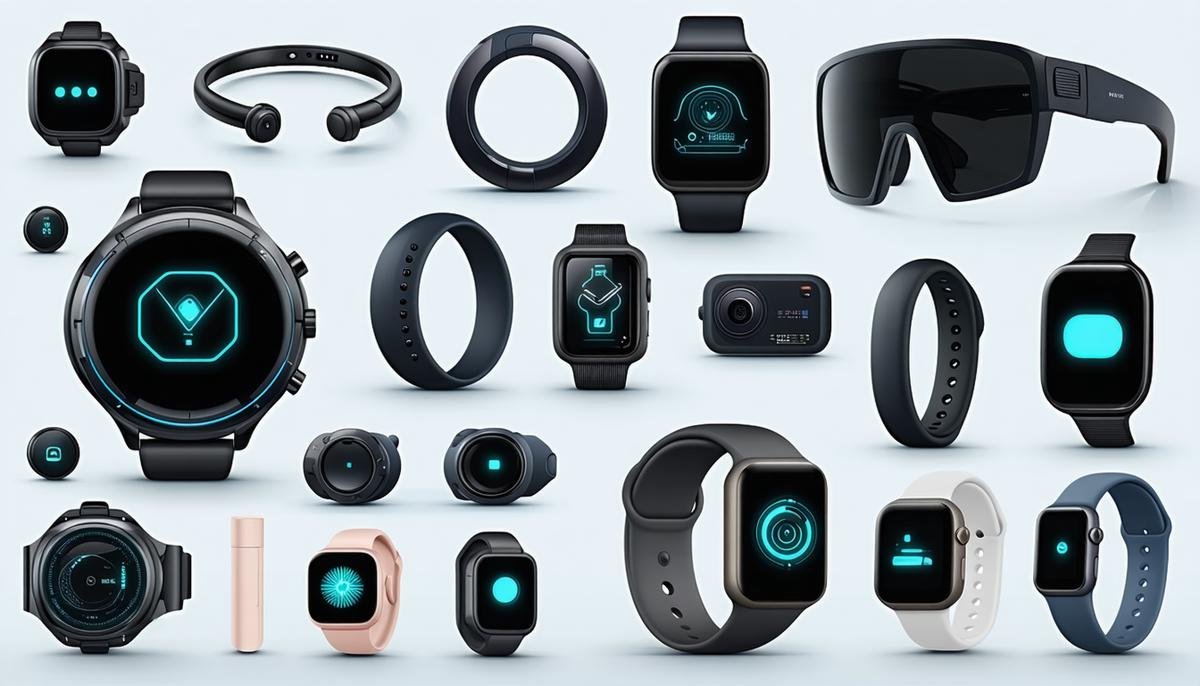Wearable health devices are entering a new era, with artificial intelligence reshaping how we interact with our health data. These gadgets are evolving from simple trackers to insightful companions in our daily lives.
Integration of AI in Wearable Health Devices
AI is transforming wearable health devices from data collectors into information powerhouses. These gadgets now offer real-time data analysis, converting numbers into digestible health insights for proactive health management.
Wearables gather a compilation of data – from heart rate and blood pressure to sleep patterns and physical activity. AI algorithms analyze this data, looking for patterns and irregularities that might be overlooked.
For instance, an AI-powered wearable monitoring sleep could advise on adjustments to improve sleep quality. When AI predicts patterns, it can offer advice on managing conditions and recommend lifestyle changes. The goal is to prevent problems before they start, making health management routine.
These health companions understand your unique health profile and can customize their advice based on your habits and history. This individualized approach provides users with a personalized health guide.
Impact on Doctor-Patient Dynamics
The integration of AI in wearable technology is redefining health interactions between doctors and patients. It enables continuous monitoring and active engagement through devices worn on our bodies.
Wearables act as diligent assistants, constantly gathering health cues and relaying information to your doctor. This continuous flow of data ensures that healthcare providers are closely involved in patients' daily health journeys.
Regarding proactive health management, wearable tech serves as a vital tool. By recognizing trends, AI can preemptively identify potential health issues, equipping both patients and healthcare providers with knowledge to avert crises before they fully form.
Wearables enhance doctor-patient dynamics through collaborative care. Patients become active participants in their health management, getting real-time insight into their health metrics. This empowerment drives a stronger partnership with doctors, maintaining a two-way communication enriched by actionable data and shared goals.
Challenges in AI and Wearable Integration
The integration of AI into wearable health devices faces significant challenges. Data privacy is a key concern, requiring strong encryption and strict data governance policies. Companies must invest in secure infrastructures and establish transparent policies about data usage to maintain user trust.
Security isn't just about preventing unauthorized access; it's about ensuring trustworthy AI recommendations. AI algorithms need to be free from biases and continually vetted to ensure accuracy.
Interoperability involves the ability of wearable devices to interact seamlessly across various healthcare platforms and systems. This requires standardized protocols and collaboration between tech companies, healthcare providers, and regulatory bodies.
Battery life is vital. As wearables become more sophisticated, ensuring efficient energy consumption becomes crucial. Innovations in battery technology and optimization in energy management are necessary to keep these gadgets running smoothly.
Addressing these challenges is crucial for the success and adoption of AI-enhanced wearables in healthcare. Overcoming hurdles like privacy, security, interoperability, and battery life will pave the way for a healthcare future where wearables serve as indispensable companions in our health journey.

Emerging Trends and Innovations
AI-powered wearables are advancing rapidly, redefining what's possible in health monitoring and management. These advancements are transforming the healthcare landscape.
A notable trend is the diversification of wearables. New types of devices cater to various health needs. Smart rings are making a statement by packing sensors into a form as minimalistic as jewelry, capable of measuring vital signs like heart rate and sleep patterns.
The scope of functionality in AI wearables has expanded. These devices are integrating AI to provide personalized health coaching and customized insights rooted in machine-learning algorithms. By analyzing a broader set of data points over time, AI wearables offer specific advice for proactive health management.
In practical terms, AI wearables can predict stress levels and suggest real-time interventions. For example, an AI wearable might detect increased heart rate variability and suggest a guided breathing session through an app.
One development is within disease management. AI-powered wearables are progressing towards non-invasive glucose monitoring for diabetics. This advancement would be significant for those managing chronic conditions.
Another frontier is the integration of augmented reality (AR) with wearable tech. Smart glasses enhanced with AI could offer real-time information overlays, potentially improving efficiency and care delivery for healthcare professionals.
Future developments will likely embrace more sophisticated AI models that leverage continual learning to deepen insights and predictive capabilities. AI systems could learn health tendencies, adapt to them, and refine their recommendations to fit evolving profiles.

AI-powered wearables are evolving beyond tracking to enhance our approach to health management. As they develop, these devices promise to transform how we engage with our well-being, offering a more informed path to health.
- Grand View Research. Digital Patient Monitoring Devices Market Size Report, 2023-2033.
- Abbott Laboratories. FreeStyle Libre 3 System. FDA Clearance Announcement, 2022.
- American Medical Association. Digital Health Research: Physicians' Motivations and Requirements for Adopting Digital Clinical Tools. 2022.
- Unger T, Lozovatsky L. AMA Moving Medicine. AI and Digital Health Trends for 2025. 2024.




